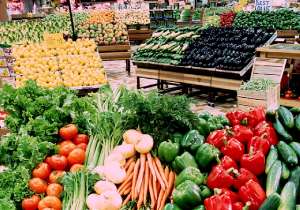
African leaders need to put in place policies that seek to integrate smallholder farmers into already available market if the continent aims to achieve sustainable economic development, says the African Economic Research Consortium (AERC).
Dr Innocent Matshe, Director of Training of the AERC says the integration needs not to be done in a commercial way, however, have to focus on developing a strategy that would promote the interest of smallholder farmers to market their products to facilitate as a link to the market and eventually grow as producers.
“At our earlier stages of our development we had in place a lot of instruments to encourage producers within our country and economy to produce and to engage in socio-economic development in the country, we need same for smallholder farmers.
“What we need to do is to put in place policy frameworks that encourage not only their participation but also their engagement at the wider scale'', Dr Matshe said in an interview during the first Annual G20 Annual Conference, in Centurion, South Africa, hosted by the South African Institute of International Affairs (SAIIA) and the Centre for Human Rights at the University of Pretoria.
The work of the AERC as a not-for-profit organisation seeks to strengthen local capacity for conducting independent, rigorous inquiry into problems pertinent to the management of economies in sub-Saharan Africa.
The idea is for African governments to put in place instruments that at the beginning give smallholder farmers a small advantage which are non-existing but frankly they deserve given their contribution to food production on the continent.
The majority of African farmers are smallholder farmers, however, recent years have seen increase investments in commercial projects, yet Africa's smallholder farmers contribute 80 percent of food needs in the face of numerous challenges.
“The road networks are bad, infrastructure is nonexistence, how do they get their commodities to the market, we need to provide that infrastructure, we need to provide subsidies to encourage and engage them in the economic transformation of the African continent'', the Director of Training at the AERC emphasised.
Experts say that the population in Africa is expected to double by 2050, and African nations will have to double their food production to keep pace with population growth. For the last 20 years, however, food production in Africa has lagged behind population growth, and the source of the problem has been low productivity on Africa's farms.
There is broad agreement among agriculture economists that growth in agriculture produces the highest level of improvements for the poorest people, especially in agriculture-based economies.
The World Bank notes that overall Gross Domestic Product (GDP) growth originating in agriculture has proven to be, on average, two to four times as effective in raising incomes of the poor as growth generated in non-agricultural sectors.
To support broad-based poverty reduction and food security in Africa, smallholder agriculture must be a central investment focus.
The Coffee Commodity Exchange in Ethiopia represents a success story of integrating smallholder farmers into market.
“The exchange takes care of market access for smallholder farmers, with agreements that give preferential treatments when the farmers join and relax those treatments as they develop'', Dr Matshe noted.
Ghana is currently putting in place measures to set up a commodity exchange, aimed at providing easy access to markets and capital for the agricultural sector, particularly smallholder farmers.
The Director-General of the Ghana Securities and Exchange Commission, Mr AduAntwi says feasibility study for the development of Commodities Exchange for soft agricultural commodities is on-going.




 Excessive partisanship breeds madness — Prof Gyampo on NPP’s defence of cedi dep...
Excessive partisanship breeds madness — Prof Gyampo on NPP’s defence of cedi dep...
 PDS scandal: ‘The totality of Ghana’s loss is the ‘dumor’ being experienced toda...
PDS scandal: ‘The totality of Ghana’s loss is the ‘dumor’ being experienced toda...
 677,140 births and 50,992 deaths recorded in 2022 - Statistical Report
677,140 births and 50,992 deaths recorded in 2022 - Statistical Report
 Prince Harry, Meghan visit Nigeria
Prince Harry, Meghan visit Nigeria
 Ghana’s electoral commission is one that trusts thieves — Omane Boamah
Ghana’s electoral commission is one that trusts thieves — Omane Boamah
 Mahama is the embodiment of corruption; he can’t advise NPP gov’t on corruption ...
Mahama is the embodiment of corruption; he can’t advise NPP gov’t on corruption ...
 All government cares about is spending more and more money on itself — Dalex Fin...
All government cares about is spending more and more money on itself — Dalex Fin...
 COVID-19: GHS records 57% vaccination coverage
COVID-19: GHS records 57% vaccination coverage
 My government will support churches – Bawumia assures Clergy
My government will support churches – Bawumia assures Clergy
 Don't be 'conduit' to President Akufo-Addo's 'I can't hand over power to Mahama'...
Don't be 'conduit' to President Akufo-Addo's 'I can't hand over power to Mahama'...
